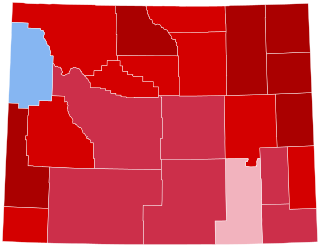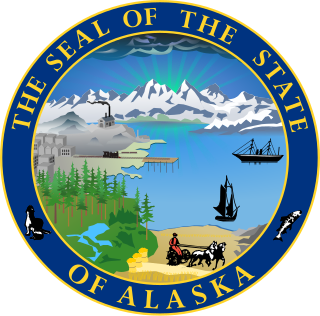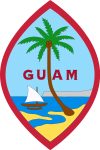
Each of the 50 U.S. states, the District of Columbia, and five territories of the United States holds either primary elections or caucuses to help nominate individual candidates for president of the United States. This process is designed to choose the candidates that will represent their political parties in the general election.

Madeleine Mary Zeien Bordallo is an American-Guamanian politician who served as the delegate to the U.S. House of Representatives for Guam's at-large congressional district from January 3, 2003, to January 3, 2019.

From January 3 to June 3, 2008, voters of the Democratic Party chose their nominee for president in the 2008 United States presidential election. Senator Barack Obama of Illinois was selected as the nominee, becoming the first African American to secure the presidential nomination of any major political party in the United States. However, due to a close race between Obama and Senator Hillary Clinton of New York, the contest remained competitive for longer than expected; neither candidate received enough pledged delegates from state primaries and caucuses to achieve a majority, without endorsements from unpledged delegates (superdelegates).

From January 3 to June 3, 2008, voters of the Republican Party chose their nominee for president in the 2008 United States presidential election. Senator John McCain of Arizona was selected as the nominee through a series of primary elections and caucuses culminating in the 2008 Republican National Convention held from Monday, September 1, through Thursday, September 4, 2008, in Saint Paul, Minnesota. President George W. Bush was ineligible to be elected to a third term due to the term limits established by the 22nd Amendment.
This article contains the results of the 2008 Republican presidential primaries and caucuses.
The results of the 2008 Democratic Party presidential primaries are the detailed outcomes of a series of contests by which members of the United States Democratic Party chose their candidate for the 2008 U.S. presidential election. The contests are held in each of the fifty U.S. states, as well as the District of Columbia, Puerto Rico, American Samoa, Guam, the U.S. Virgin Islands, and Democrats Abroad. The Northern Mariana Islands was the lone U.S. state or territory which did not have a primary or caucus election in 2008. The outcomes include totals of delegates selected as well as popular votes.

The 2008 United States presidential election in Iowa took place on November 4, 2008, as part of the 2008 United States presidential election. Voters chose seven representatives, or electors to the Electoral College, who voted for president and vice president.

The 2008 Guam Democratic presidential caucus took place on May 3, 2008. Senator Barack Obama won by 7 votes, a margin of less than 0.2%. This resulted in each candidate getting 2 pledged delegates to the 2008 Democratic National Convention. Guam Democrats also sent five unpledged superdelegates to the convention.

Voters of the Republican Party elected state delegations to the 2012 Republican National Convention in presidential primaries. The national convention then selected its nominee to run for President of the United States in the 2012 presidential election. There were 2,286 delegates chosen, and a candidate needed to accumulate 1,144 delegate votes at the convention to win the nomination. The caucuses allocated delegates to the respective state delegations to the national convention, but the actual election of the delegates were, many times, at a later date. Delegates were elected in different ways that vary from state to state. They could be elected at local conventions, selected from slates submitted by the candidates, selected at committee meetings, or elected directly at the caucuses and primaries.

From January 3 to June 5, 2012, voters of the Democratic Party chose its nominee for president in the 2012 United States presidential election. President Barack Obama won the Democratic Party nomination by securing more than the required 2,383 delegates on April 3, 2012, after a series of primary elections and caucuses. He was formally nominated by the 2012 Democratic National Convention on September 5, 2012, in Charlotte, North Carolina.

This article contains the results of the 2012 Republican presidential primaries and caucuses, which resulted in the nomination of Mitt Romney as the Republican nominee for President of the United States. The 2012 Republican primaries were the selection processes by which the Republican Party selected delegates to attend the 2012 Republican National Convention from August 27–30. The series of primaries, caucuses, and state conventions culminated in the national convention, where the delegates cast their votes to formally select a candidate. A simple majority (1,144) of the total delegate votes (2,286) was required to become the party's nominee.

The 2012 United States presidential election in Louisiana took place on November 6, 2012, as part of the 2012 United States presidential election in which all 50 states plus the District of Columbia participated. Louisiana voters chose eight electors to represent them in the Electoral College via a popular vote pitting incumbent Democratic President Barack Obama and his running mate, Vice President Joe Biden, against Republican challenger and former Massachusetts Governor Mitt Romney and his running mate, Congressman Paul Ryan.

The 2012 United States presidential election in Wyoming took place on November 6, 2012, as part of the 2012 United States presidential election in which all 50 states plus the District of Columbia participated. Wyoming voters chose three electors to represent them in the Electoral College via a popular vote pitting incumbent Democratic President Barack Obama and his running mate, Vice President Joe Biden, against Republican challenger and former Massachusetts Governor Mitt Romney and his running mate, Congressman Paul Ryan.

The 2012 United States presidential election in Alaska took place on November 6, 2012, as part of the 2012 United States presidential election in which all 50 states plus the District of Columbia participated. Alaska voters chose three electors to represent them in the Electoral College via a popular vote pitting incumbent Democratic President Barack Obama and his running mate, Vice President Joe Biden, against Republican challenger and former Massachusetts Governor Mitt Romney and his running mate, Congressman Paul Ryan.

Presidential primaries and caucuses were organized by the Democratic Party to select the 4,051 delegates to the 2016 Democratic National Convention held July 25–28 and determine the nominee for President in the 2016 United States presidential election. The elections took place within all fifty U.S. states, the District of Columbia, five U.S. territories, and Democrats Abroad and occurred between February 1 and June 14, 2016. Between 2008 and 2020, this was the only Democratic Party primary in which the nominee had never been nor had ever become President of the United States. This was the first time the Democratic primary had nominated a woman for president.

Presidential primaries and caucuses of the Republican Party took place within all 50 U.S. states, the District of Columbia, and five U.S. territories between February 1 and June 7, 2016. These elections selected the 2,472 delegates that were sent to the Republican National Convention. Businessman and reality television personality Donald Trump won the Republican nomination for president of the United States.

This article contains the results of the 2016 Republican presidential primaries and caucuses, the processes by which the Republican Party selected delegates to attend the 2016 Republican National Convention from July 18–21. The series of primaries, caucuses, and state conventions culminated in the national convention, where the delegates cast their votes to formally select a candidate. A simple majority (1,237) of the total delegate votes (2,472) was required to become the party's nominee and was achieved by the nominee, businessman Donald Trump of New York.

Although the United States Virgin Islands did not participate in the 2020 presidential election because it is a U.S. territory and not a state, it still participated in the U.S. presidential caucuses and primaries. Former vice president Joe Biden won the Democratic caucuses, held on June 6. The Republican caucuses, held on March 14 in the form of a territorial convention, voted for incumbent president Donald Trump.

Below is a detailed tally of the results of the 2020 Republican Party presidential primary elections in the United States. In most U.S. states outside New Hampshire, votes for write-in candidates remain untallied.

Although Guam did not participate in the 2020 presidential election because it is a U.S. territory and not a state, it still participated in the U.S. presidential primaries and caucuses. Former vice president Joe Biden won the Democratic caucus, held on June 6. The Republican caucus, held on March 14 in the form of a "state convention", endorsed incumbent President Donald Trump.


















